Small capitalization, or “small cap,” stocks have generated attractive investment returns over the long term. In fact, dating back to 1926 through 2019, U.S. small cap stocks have produced annualized total returns of 11.90%, compared to 10.14% for U.S. large cap stocks, and 5.5% for U.S. government bonds. There are several reasons small cap stocks have outperformed, including higher levels of long-term earnings growth and greater research inefficiencies due to a smaller number of “buy-side” and “sell-side” investors focused in the small cap spectrum of the market due to liquidity. Small cap stocks also outperformed over time because they are inherently a riskier asset class. Looking closer at the U.S. small cap asset class, one of the reasons they are riskier and more volatile is the percentage of unprofitable companies in the asset class. As of March 31, 2020, about 27% of companies within the Russell 2000 Index were unprofitable.
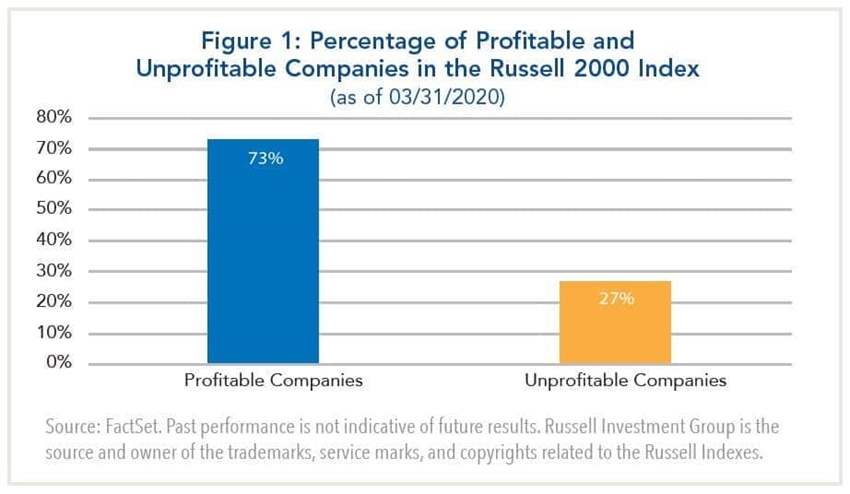
The Russell 2000 Index is a widely used small cap benchmark. In fact, passive mutual funds with a significant amount of assets mirror this market-cap weighted benchmark. Many investors might believe a passive fund is “more secure,” not realizing the high level of exposure to unprofitable companies. A successful active manager has the opportunity to dig deeper to find the most promising small cap stocks with strong business models that exhibit growth, profitability, and free cash flow generation that allows them compound returns over time.
The Touchstone Small Company Fund seeks to invest in small cap stocks. This is one of the key tenets of our investment philosophy. Avoiding unprofitable small cap stocks potentially reduces the risk levels of investing in small cap stocks. Furthermore, and most importantly, profitable small cap stocks have historically outperformed unprofitable small cap stocks with significantly lower volatility. The chart below illustrates the performance of the profitable and unprofitable constituents of the Russell 2000 Index since July 2001.
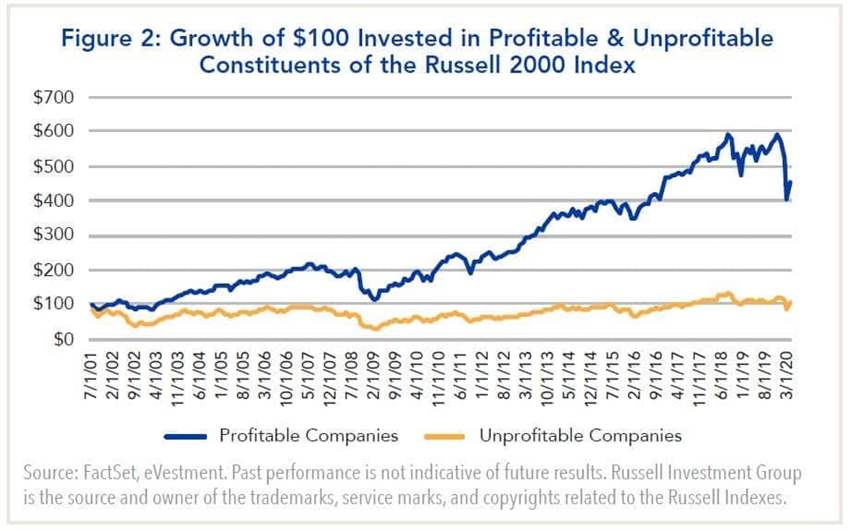
There are a few reasons why profitable small cap stocks have outperformed over time. First, they generally do not require access to capital to fund their operations. During an economic downturn or any period where the cost of capital is increasing, unprofitable stocks are at a significant disadvantage. Unprofitable small cap stocks have going-concern or bankruptcy risk in recessions. Another reason is that profitable small cap companies can internally invest in future growth, compounding earnings growth over time, which is ultimately what drives long-term stock returns. Profitability provides flexibility to manage through economic slowdowns and recessions. The chart below illustrates the maximum drawdown risk or declines between profitable and unprofitable stocks in the Russell 2000 Index.
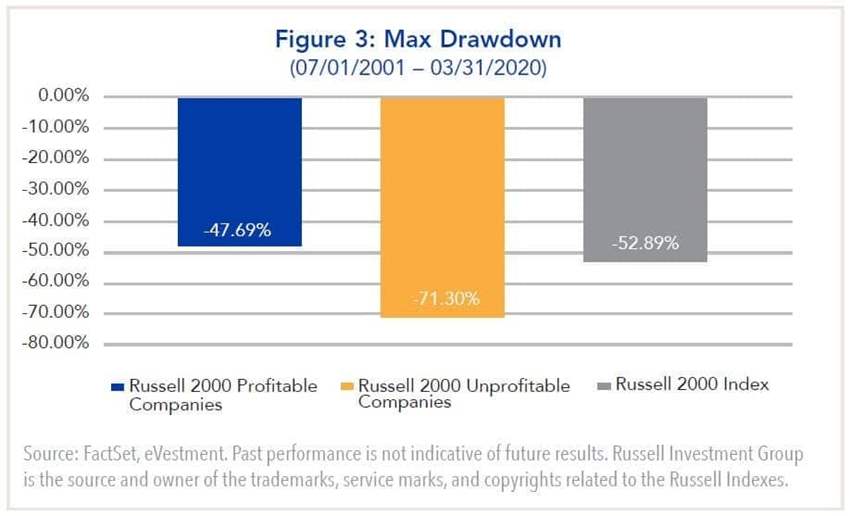
Profitable stocks have outperformed unprofitable stocks in more challenging economic environments, and they also have performed well in robust bull markets. The chart below illustrates the Up Capture Ratio and Down Capture Ratio for profitable and unprofitable small cap stocks over the period. These up and down capture ratios show whether profitable companies (as a whole) —meaning gained more or lost less than—than the benchmark during periods of market strength and weakness, and if so, by how much.
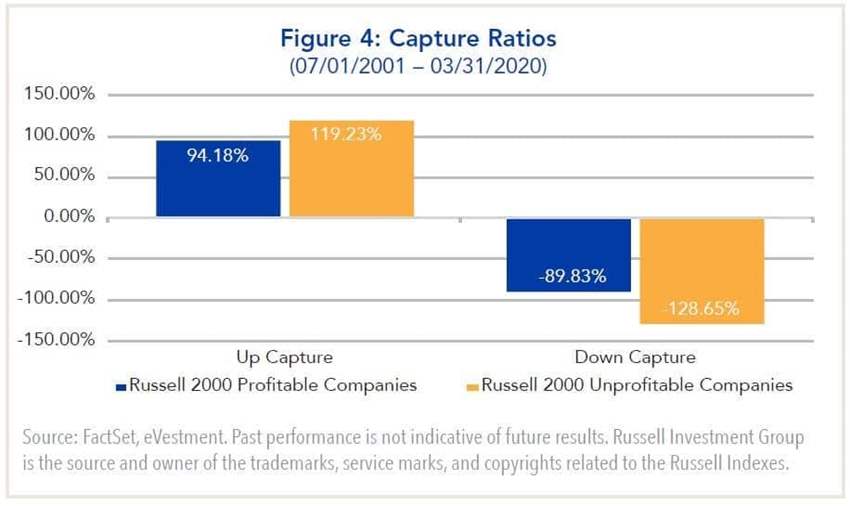
When combining the historically favorable long-term outperformance and lower volatility characteristic of profitable small cap stocks, there is a compelling reward compared to risk for investing in the profitable spectrum of the U.S. small cap asset class.
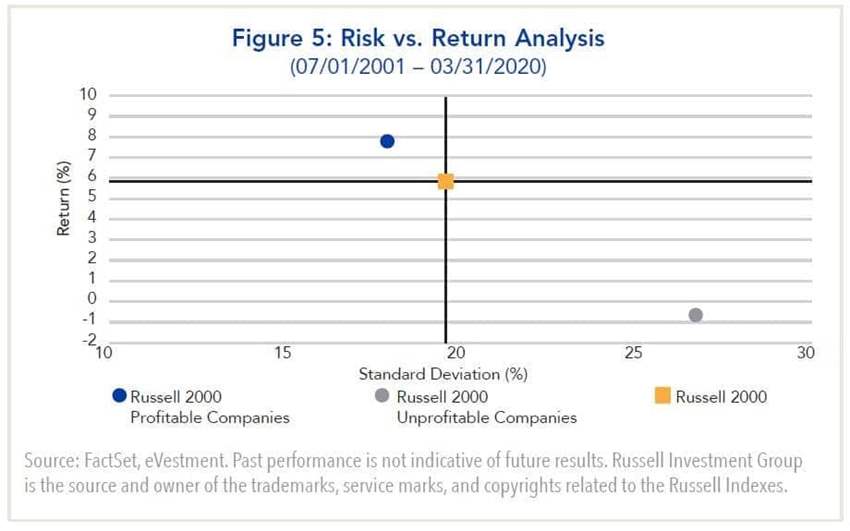
Bottom Line
Small cap stocks are an inefficient asset class for several reasons – research coverage, liquidity, capacity, and volatility. Due to these inefficiencies and their long-term earnings growth, U.S. small cap stocks historically have generated attractive investment returns and outperformed large cap stocks. The key to investing in small cap stocks is the opportunity to capture the benefits while minimizing the risk. We believe a compelling way to capture those returns while reducing risk is to invest only in profitable small cap stocks. The Touchstone Small Company Fund, sub-advised by Fort Washington, focuses on profitable small cap stocks.
Fort Washington Investment Advisors, Inc. is the Sub-Advisor to the Touchstone Small Company Fund. The author, Jason V. Ronovech, CFA, is the portfolio manager of the Touchstone Small Company Fund. Touchstone Investments and Fort Washington Investment Advisors are members of Western & Southern Financial Group.
This commentary is for informational purposes only and should not be used or construed as an offer to sell, a solicitation of an offer to buy, or a recommendation to buy, sell or hold any security. There is no guarantee that the information is complete or timely. Past performance is no guarantee of future results. Investing in an index is not possible. Investing involves risk, including the possible loss of principal and fluctuation of value. Please visit touchstoneinvestments.com for performance information current to the most recent month-end.
Please consider the investment objectives, risks, charges and expenses of the fund carefully before investing. The prospectus and the summary prospectus contain this and other information about the Fund. To obtain a prospectus or a summary prospectus, contact your financial professional or download and/or request one on the resources section or call Touchstone at 800-638-8194. Please read the prospectus and/or summary prospectus carefully before investing.
Touchstone Funds are distributed by Touchstone Securities, Inc.*
*A registered broker-dealer and member FINRA/SIPC.
Not FDIC Insured | No Bank Guarantee | May Lose Value


















